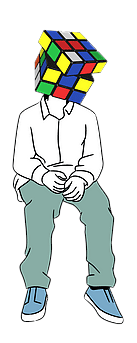INTERSECTIONALITY
Being individuals who need association while living in a society that is so vast, the basis of existence becomes the creation of fragments and communities. We derive our identity from these communities – some of which we voluntarily seek to be a part of, while others just are. Our mental health does not exist in isolation from these identities.
Imagine a rubik’s cube, or better yet if you have one, get hold of it. Now think of all the communities you are a part of – the identities you introduce yourself to people with – your race, gender, sexuality, caste, class, academic field, educational institution, career, work institutions, each one of them. For each identity you can think of, slide a random side. When you exhaust all you can think of, what is the image of the cube you are left with? That rubik’s cube is your Mental Health.
However, the same identities do not affect different individuals in similar ways. So, while coming from a privileged wealthy background means sliding the side once, someone who comes from a relatively less affluent background would slide the side twice or thrice.
This gets us to a point where some people have relatively less complex and easier to solve cube while others’ cube would be too entangled.
This is where the idea of intersectionality in Mental Health comes in – the different identities that surround us impact our mental health in different ways.
This is not to say that being part of that community or having that identity in itself is the problem. The issues stem from the socio-economic and political context behind those identities. So whereas coming from a minority religion in India could be a source of distress for individuals, the same identity in a country where that is the majority religion would not have the same detrimental impact.
The current discourse in mental health seems to not be taking into account the fact that a universal system of redressal does not work. Just as one common algorithm would not help solve each of our cubes, a common system of therapy or rehabilitation does not work on every individual.

